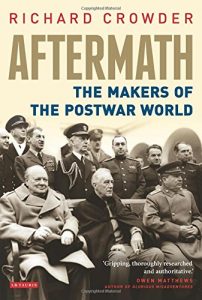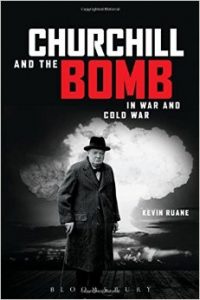
Finest Hour 186
The Cold War’s Ground Zero: Westminster College and the John Findley Green Foundation Lectureship
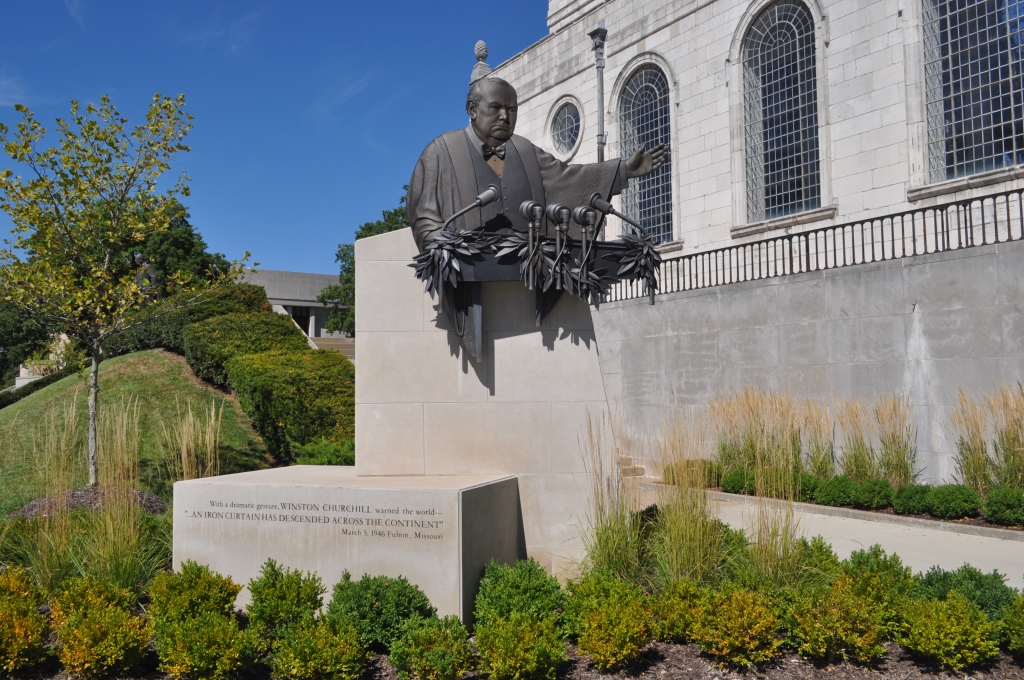
America's National Churchill Museum at Westminster College
January 28, 2020
Finest Hour 186, Fourth Quarter 2019
Page 08
By Timothy Riley
In July 1945, while on a fishing holiday on Minnesota’s North Star Lake, Westminster College President Franc L. McCluer, had a casual conversation with his wife Ida Belle. Though the scene was tranquil, McCluer— known by the nickname “Bullet” for his rapid-fire debating style—was consumed with thoughts about the college’s John Findley Green Foundation Lectureship. After a three-year hiatus, when the all-male college saw reduced enrollment due to the war effort, McCluer hoped to revive the fledgling but promising lecture series that previously had brought international luminaries to his Fulton, Missouri campus.
The endowed lectureship was established in 1937 by Mrs. Eleanor I. Green of St. Louis to honor the memory of her husband, a Westminster alumnus. The aim of the Green Foundation Lectureship was then, and remains today, to present lectures that would promote “a better understanding of economic and social problems which are international in their concern.”
“How about Winston Churchill?” Bullet McCluer blurted to his wife as they sat in the north woods pondering the question of who would give the 1946 lecture. After a pause Ida Belle responded affirmatively, “What do we have to lose?”
And so, with that exchange in a fishing boat in rural Minnesota, Bullet McCluer fired the first shot in his campaign to invite Winston Churchill to Fulton. He followed with a two-month barrage of conversations, planning, and an intercession by President Harry S. Truman. All told, it set the stage for the start of Cold War rhetoric.

2024 International Churchill Conference
On 3 October 1945, McCluer signed a one-page, typewritten letter on Westminster College letterhead inviting Churchill to Fulton. At the bottom of the page the President of the United States added an encouraging note: “This is a wonderful school in my home state. Hope you can do it. I’ll introduce you. Best regards, Harry Truman.” Historians agree that President Truman’s famous postscript is the chief reason Churchill accepted McCluer’s invitation. After all, Churchill responded directly to the White House, not Westminster College. Still, in his carefully crafted letter to the former prime minister, the Bullet of Westminster wrote with a mixture of prescience and flattery that appealed to the statesman: “We know that any discussions coming from you and delivered from this forum here in the heart of the United States will be of immense and enduring significance, and will promote the international understanding to the maintenance of peace.”
At the time, no one—with the possible exception of Churchill himself—could know how true President McCluer’s statement would later become.
The John Findley Green Foundation Lectures
Of the fifty-nine of the John Findley Green Foundation Lectures that have been delivered, Churchill’s “Sinews of Peace” (commonly known as the “Iron Curtain” speech) stands apart.
Most of the lectures since Churchill’s comment upon directly, or at least mention, the Cold War. Former Presidents and Vice Presidents—Harry Truman (1954), Hubert Humphrey (1967), Gerald Ford (1977), George H. W. Bush (1986)—have delivered the lecture. Former British Prime Ministers Edward Heath (1982) and Margaret Thatcher (1996) also followed Churchill’s footsteps to Fulton.
Examining the history of the Cold War and its aftermath through the lens of all of the Green Foundation lectures is a study still to be done, but it is particularly useful to look at Churchill’s “Sinews of Peace” (1946) in tandem with the 1992 lecture by former Soviet President Mikhail Gorbachev, “A River of Time and the Imperative of Action.”
Extended excerpts from both speeches are presented here as primary sources with only simple rubrics to permit the reader to compare similar or significant themes. The full texts of both speeches can be found on the web site of America’s National Churchill Museum. Find out more here.
“The Sinews of Peace” Winston Churchill, 5 March 1946
Churchill’s warning of an “iron curtain” descending and his prescription to the West on how to wage the Cold War were seen by Joseph Stalin as the beginning of the decades-long conflict between the Soviet Union and the Western allies, the United States in particular.
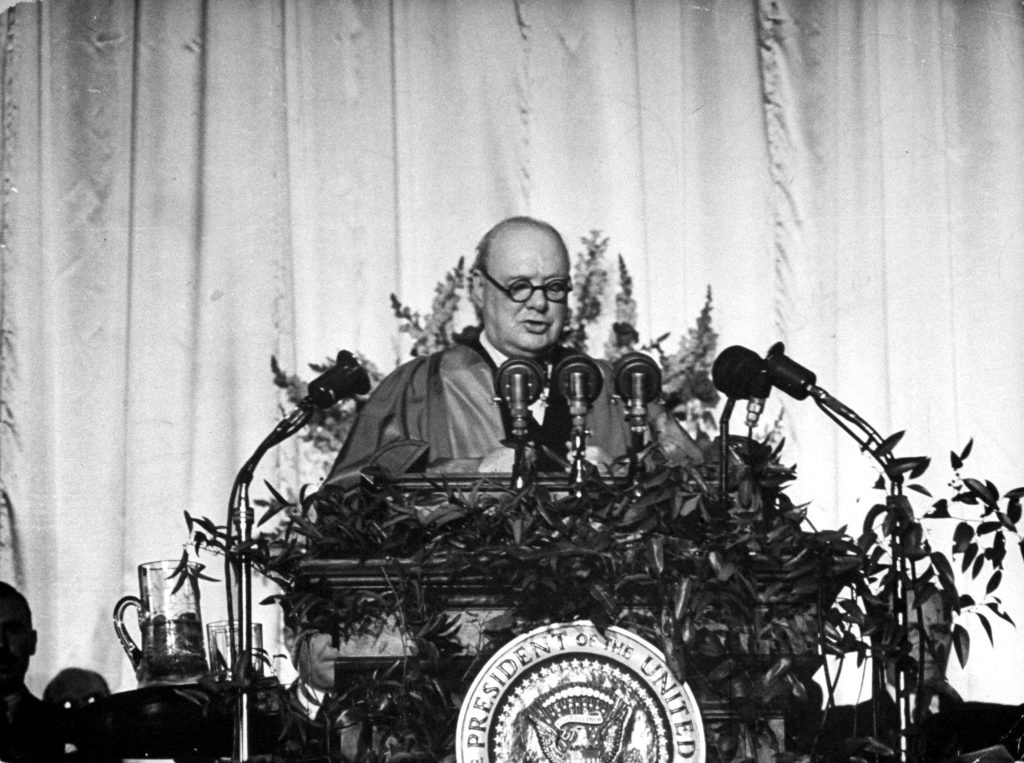
It did not begin that way.
The printed program distributed for the seventh John Findley Green Foundation Lecture listed the order of ceremony, which was held in the largest hall on the Westminster campus—the gymnasium. Churchill and President Truman received honorary degrees, Missouri Governor Phil Donnelly and Bullet McCluer made brief statements before President Truman, fulfilling his post-script promise, introduced Churchill. The speech took fifty minutes, and its impact lasted five decades. The title listed in the program was simply “World Peace.”
The near-final draft of the speech, with last-minute edits dictated to, and written in shorthand by Churchill’s secretary Nina Edith “Jo” Sturdee, reveals that while Churchill’s message was clearly and carefully composed in advance, he waited until the day before he embarked via train from Washington, D.C. to Missouri to give the famous speech its title “The Sinews of Peace.” Churchill’s carefully chosen word “sinew” evokes the bond, or “special relationship” (another phrase coined in the speech), that joins the United States and Britain. What follows are highlights from Churchill’s remarks.
The United States at Pinnacle of World Power
“The United States stands at this time at the pinnacle of world power. It is a solemn moment for the American Democracy. For with primacy in power is also joined an awe-inspiring accountability to the future.”
The United Nations Can Preserve the Peace
“A world organization has already been erected for the prime purpose of preventing war, U.N.O., the successor of the League of Nations, with the decisive addition of the United States and all that means, is already at work. We must make sure that its work is fruitful, that it is a reality and not a sham, that it is a force for action, and not merely a frothing of words, that it is a true temple of peace in which the shields of many nations can some day be hung up, and not merely a cockpit in a Tower of Babel.”
The United Nations Should Have an Armed Force
“I have, however, a definite and practical proposal to make for action. Courts and magistrates may be set up but they cannot function without sheriffs and constables. The United Nations Organization must immediately begin to be equipped with an international armed force. In such a matter we can only go step by step, but we must begin now.”
Nuclear Arsenal Should Be Limited
“It would nevertheless be wrong and imprudent to entrust the secret knowledge or experience of the atomic bomb, which the United States, Great Britain, and Canada now share, to the world organization, while it is still in its infancy. It would be criminal madness to cast it adrift in this still agitated and un-united world. No one in any country has slept less well in their beds because this knowledge and the method and the raw materials to apply it, are at present largely retained in American hands. I do not believe we should all have slept so soundly had the positions been reversed and if some Communist or neo-Fascist State monopolized for the time being these dread agencies. The fear of them alone might easily have been used to enforce totalitarian systems upon the free democratic world, with consequences appalling to human imagination.”
Deterrence as Strategy
“God has willed that this shall not be and we have at least a breathing space to set our house in order before this peril has to be encountered: and even then, if no effort is spared, we should still possess so formidable a superiority as to impose effective deterrents upon its employment, or threat of employment, by others.”
Western Strength Will Prevent Conflict
“On the other hand I repulse the idea that a new war is inevitable; still more that it is imminent. It is because I am sure that our fortunes are still in our own hands and that we hold the power to save the future, that I feel the duty to speak out now that I have the occasion and the opportunity to do so. I do not believe that Soviet Russia desires war. What they desire is the fruits of war and the indefinite expansion of their power and doctrines. But what we have to consider here today while time remains, is the permanent prevention of war and the establishment of conditions of freedom and democracy as rapidly as possible in all countries. Our difficulties and dangers will not be removed by closing our eyes to them. They will not be removed by mere waiting to see what happens; nor will they be removed by a policy of appeasement. What is needed is a settlement, and the longer this is delayed, the more difficult it will be and the greater our dangers will become.
“From what I have seen of our Russian friends and Allies during the war, I am convinced that there is nothing they admire so much as strength, and there is nothing for which they have less respect than for weakness, especially military weakness. For that reason the old doctrine of a balance of power is unsound. We cannot afford, if we can help it, to work on narrow margins, offering temptations to a trial of strength. If the Western Democracies stand together in strict adherence to the principles of the United Nations Charter, their influence for furthering those principles will be immense and no one is likely to molest them. If however they become divided or falter in their duty and if these all-important years are allowed to slip away then indeed catastrophe may overwhelm us all.”
The Sinews of Peace
“Last time I saw it all coming and cried aloud to my own fellow-countrymen and to the world, but no one paid any attention. Up till the year 1933 or even 1935, Germany might have been saved from the awful fate which has overtaken her and we might all have been spared the miseries Hitler let loose upon mankind. There never was a war in all history easier to prevent by timely action than the one which has just desolated such great areas of the globe. It could have been prevented in my belief without the firing of a single shot, and Germany might be powerful, prosperous and honored to-day; but no one would listen and one by one we were all sucked into the awful whirlpool. We surely must not let that happen again. This can only be achieved by reaching now, in 1946, a good understanding on all points with Russia under the general authority of the United Nations Organization and by the maintenance of that good understanding through many peaceful years, by the world instrument, supported by the whole strength of the English-speaking world and all its connections. There is the solution which I respectfully offer to you in this Address to which I have given the title ‘The Sinews of Peace.’”
“The River of Time and the Imperative of Action” Mikhail Gorbachev, 6 May 1992
When Mikhail Gorbachev arrived at Westminster College, he spoke outdoors before a crowd of 20,000—nearly ten times the size of the audience gathered to hear Churchill speak in the Westminster gymnasium. Standing at the same lectern used by Churchill nearly a half century earlier, the former Soviet leader delivered the 46th John Findley Green Foundation Lecture. He spoke in Russian with simultaneous translation into English by US State Department interpreter Harris Coulter. Behind Gorbachev stood the most poignant symbol of the Cold War—the Berlin Wall—the concrete manifestation of the iron curtain as sculpted by artist and Churchill granddaughter, Edwina Sandys.
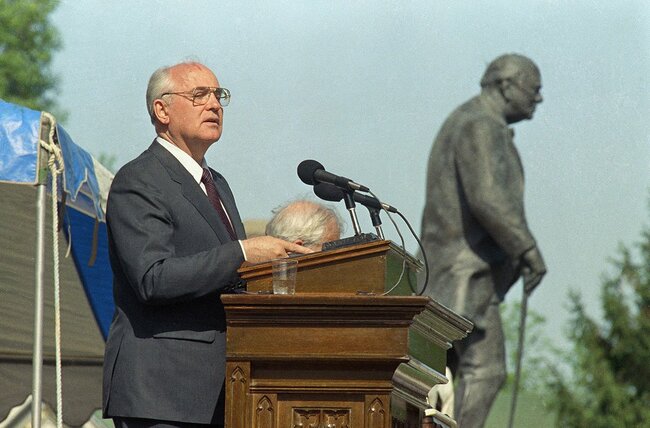
On Churchill’s Speech
“More than forty-six years ago Winston Churchill spoke in Fulton, and in my country this speech was interpreted as the formal declaration of the ‘Cold War.’ This was indeed the first time the words, ‘Iron Curtain,’ were pronounced, and the whole Western world was challenged to close ranks against the threat of tyranny in the form of the Soviet Union and Communist expansion. Everything else in this speech, including Churchill’s analysis of the postwar situation in the world, his thoughts about the possibility of preventing a third world war, the prospects for progress, and methods of reconstructing the postwar world, remained unknown to the Soviet people.
“Today, in paying tribute to this eminent statesman, we can evaluate more quietly and objectively both the merits of his speech and the limitations of the analysis which it included, his ideas and predictions, and his strategic principles.”
The World since 1946
“Since that time the world in which we live has undergone tremendous changes. Even so, however paradoxical it may sound, there is a certain similarity between the situation then and today. Then, the prewar structure of international relations had virtually collapsed, a new pattern of forces had emerged along with a new set of interests and claims.
“Different trends in world development could be discerned, but their prospects were not clearly outlined. New possibilities for progress had appeared. Answers had to be found to the challenges posed by new subjects of international law. The atmosphere was heavy—not only with hope, but also with suspicion, lack of understanding, unpredictability.
“In other words, a situation had emerged in which a decision with universal implications had to be taken. Churchill’s greatness is seen in the fact that he was the first among prominent political figures to understand that.”
Soviet Errors
“If the United States and the Soviet Union had been capable of understanding their responsibility and sensibly correlating their national interests and strivings with the rights and interests of other states and peoples, the planet today would be a much more suitable and favorable place for human life. I have more than once criticized the foreign policy of the Stalinist leadership in those years. Not only was it incapable of reevaluating the historical logic of the interwar period, taking into account the experience and results of the war, and following a course which corresponded to the changed reality, it committed a major error in equating the victory of democracy over fascism with the victory of socialism and aiming to spread socialism throughout the world.”
American Errors
“But the West, and the United States in particular, also committed an error. Its conclusion about the probability of open Soviet military aggression was unrealistic and dangerous. This could never have happened, not only because Stalin, as in 1939–1941, was afraid of war, did not want war, and never would have engaged in a major war. But primarily because the country was exhausted and destroyed; it had lost tens of millions of people, and the public hated war. Having won a victory, the army and the soldiers were dying to get home and back to a normal life.”
Lack of Strategic Vision
“So I would be so bold as to affirm that the governing circles of the victorious powers lacked an adequate strategic vision of the possibilities for world development as they emerged after the war—and, consequently, a true understanding of their own countries’ national interests. Hiding behind slogans of ‘striving for peace’ and defense of their people’s interests on both sides, decisions were taken which split asunder the world which had just succeeded in overcoming fascism because it was united.
“And on both sides this was justified ideologically. The conflict was presented as the inevitable opposition between good and evil—all the evil, of course, being attributed to the opponent. This continued for decades until it became evident that we were approaching the abyss. I am stating this because the world community has paid dearly for the errors committed at this turning-point in world history.”
Victory for the World
“In the major centers of world politics the choice, it would seem, has today been made in favor of peace, cooperation, interaction, and common security. And in pushing forward to a new civilization we should under no circumstances again make the intellectual, and consequently political, error of interpreting victory in the ‘Cold War’ narrowly as a victory for oneself, one’s own way of life, for one’s own values and merits. This was a victory over a scheme for the development of humanity which was becoming slowly congealed and leading us to destruction. It was a shattering of the vicious circle into which we had driven ourselves. This was altogether a victory for common sense, reason, democracy, and common human values.”
Paradigm Shift for the World
“Churchill urged us to think ‘super strategically,’ meaning by this the capacity to rise above the petty problems and particularities of current realities, focusing on the major trends and being guided by them.
“What are the characteristics of the world situation today? In thinking over the processes, which we ourselves have witnessed, we are forced to conclude that humanity is at a major turning-point. Not only the peoples of the former USSR, but the whole world is living through this watershed situation. This is not just some ordinary stage of development, like many others in world history. This is a turning-point on a historic and worldwide scale and signifies the incipient substitution of one paradigm of civilization by another.”
Global Security, but Not Through Arms
“First and foremost, it signifies the possibility of creating a global international security system, thus preventing large-scale military conflicts like the world wars of the twentieth century and facilitating a radical reduction in levels of armaments and reducing the burden of military expenditures. This signifies that the attention, and the resources, of the world community can be focused on solving problems in non-military areas: population, environment, food production, energy sources, and the like. This means new opportunities for economic progress, ensuring normal conditions of life for the Earth’s growing population and improved living conditions.
“We have, in fact, already started moving in that direction. But the significance of these changes, while a great source of hope, should not blind us to the dangers—some of which we have already encountered. It would be a supreme tragedy if the world, having overcome the ‘1946 model,’ were to find itself once again in a ‘1914 model’ world. A major international effort will be needed to render irreversible the shift in favor of a democratic world— and democratic for the whole of humanity, not just for half of it.”
The United Nations
“All of these problems demand an enhanced level of organization of the international community. However, even now, at a time of sharply increased interdependence in the world, many countries are morbidly jealous of their sovereignty, and many peoples of their national independence and identity. This is one of the newest global contradictions, one which must be overcome by joint effort. That it can, in principle, be overcome can be seen from the experience of the European communities and, although still to only a slight degree, from the European process as a whole.
“Here the decisive role may and must be played by the United Nations. Of course, it must be restructured, together with its component bodies, in order to be capable of confronting the new tasks. These ideas have long been under discussion, and many proposals have been put forward. I myself have no plan of my own for reorganizing the United Nations. I will just address the basic parameters of the changes, which are ready for solution.
“The United Nations, which emerged from the results and the lessons of the Second World War, is still marked by the period of its creation. This is true both with respect to the makeup of its subsidiary bodies and auxiliary institutions and with respect to its functioning. Nothing, for instance, other than the division into victors and vanquished, explains why such countries as Germany and Japan do not figure among the permanent members of the Security Council.
“In general, I feel Article 53 on ‘enemy states’ should be immediately deleted from the UN Charter. Also, the criterion of possession of nuclear weapons would be archaic in the new era before us. The great country of India should be represented in the Security Council. The authority and potential of the Council would also be enhanced by incorporation on a permanent basis of Italy, Indonesia, Canada, Poland, Brazil, Mexico, and Egypt, even if initially they do not possess the veto.
“The Security Council will require better support, more effective and more numerous peace-keeping forces. Under certain circumstances it will be desirable to put certain national armed forces at the disposal of the Security Council, making them subordinate to the United Nations military command.
“The proposal, which I accept, has already been made that a global system be established for monitoring emergencies. The United Nations Secretary-General should be authorized to put it into action even before a conflict becomes violent. Closer coordination of UN organs with regional structures would only enhance its capacity to settle disputes in the world.
“Of course, the UN’s contemporary role, and, first and foremost, an expanded and strengthened Security Council, will require substantial funding. The method adopted for financing at the founding of the United Nations revealed its weaknesses just as soon as, some years later, it became more active and came closer to actually carrying out the tasks assigned by its founders. This method must be supplemented by some mechanism tying the UN to the world economy.”
Peace and Progress for All
“In concluding I would like to return to my starting-point. From this tribune Churchill appealed to the United Nations to rescue peace and progress, but he appealed primarily to Anglo-Saxon unity as the nucleus to which others could adhere. In the achievement of this goal the decisive role, in his view, was to be played by force, above all, by armed force. He even entitled his speech ‘The Sinews of Peace.’
“The goal today has not changed: peace and progress for all. But now we have the capacity to approach it without paying the heavy price we have been paying these past fifty years or so, without having to resort to means which put the very goal itself in doubt, which even constitute a threat to civilization. And while continuing to recognize the outstanding role of the United States of America, and today of other rich and highly developed countries, we must not limit our appeal to the elect, but call upon the whole world community.
“In a qualitatively new and different world situation the overwhelming majority of the United Nations will, I hope, be capable of organizing themselves and acting in concert on the principles of democracy, equality of rights, balance of interests, common sense, freedom of choice, and willingness to cooperate. Made wise by bitter experience, they will, I think, be capable of dispensing, when necessary, with egoistic considerations in order to arrive at the exalted goal which is man’s destiny on earth.”
Timothy Riley is the Sandra L. and Monroe E. Trout Director and Chief Curator and Churchill Fellow of America’s National Churchill Museum at Westminster College in Fulton, MO.
Subscribe
WANT MORE?
Get the Churchill Bulletin delivered to your inbox once a month.
